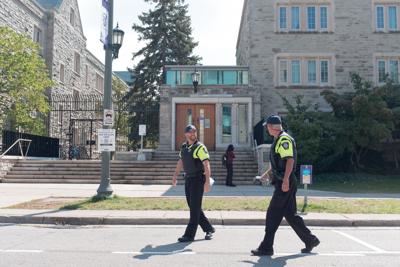
Campus Police officers patrol outside Med-Syd Hall, Sept. 17, 2021.
Western’s student council executives motioned to “declare a sexual and gender-based violence crisis is occurring on campus” and demand Western do the same.
The council will not formally vote on the motion until their meeting Mar. 2. The motion, presented by University Students’ Council president Zamir Fakirani, alleges Western University “is aware of the intensity and the gravity of the gender-based violence we're experiencing on this campus,” and not sufficiently acting on previous recommendations proposed to address the issue.
“Publicly declaring a crisis will pressure Western to acknowledge the true intensity and violent nature of the gender-based violence our students have been subject to,” read a slide from the executives’ presentation. “If we do not acknowledge the problem … change will continue to be slow and insufficient.”
In the nearly half-hour-long presentation to councillors Wednesday night, the student council executives outlined “a record of university inaction” on sexual and gender-based violence over the past four years.
The council referred to the recommendations Western produced after the 2018 Student Voices on Sexual Violence Survey found over 71 per cent of the 8,000 Western student respondents reported experiencing sexual harassment during the academic year — the highest of any university in the province. In response, Western’s Student Experience Office recommended the university develop a comprehensive SGBV educational program for students and streamline its reporting systems.
Fakirani expressed in the council presentation that “these recommendations that were produced years ago sound awfully familiar to what we're producing today,” referring to the four early recommendations Western’s Gender-Based and Sexual Violence Action Committee released earlier this month, which also recommended the university develop mandatory gender-based and sexual violence education modules for incoming students.
“I'm not going to say that we haven't seen progress, because we have,” said Fakirani. “But it hasn't been adequate, and our students are still feeling unsafe.”
Western did not respond to a request for comment Wednesday night.
The executives said they hope declaring a crisis will prevent similar “inaction” with the recommendations submitted in response to the reports of sexual violence from this year’s Orientation Week, which are expected to be published in the spring.
“We want to make sure that we're not just welcoming and endorsing the recommendations, but that we're acting upon them,” said Fakirani. “Unless the university starts to become a lot more transparent about how that process is gonna look, I worry about the implementation and the timeline of implementation.”
Western University’s acting president Sarah Prichard responded to the USC’s criticisms in a statement to the Gazette, stating the university is committed to working with the USC anti-sexual violence initiatives and has “a long history of actively focusing on this work.”
“GBSV is a longstanding – and increasingly pressing – societal issue, and one that all universities and colleges are working to address. Facing it head on requires a collective effort and the engagement of our whole community,” said Prichard. “We remain very committed to working with students, including the USC, to take further action.”
Prichard then outlined numerous measures the university has taken to address sexual violence on campus in recent years, including hiring 15 new security guards and four additional campus police officers as well as made additional counselling available to students. Prichard also highlighted that Western’s sexual violence policy was one of the first stand-alone policies in Canada in 2014 and consulted over 400 community responses when it was reviewed in 2019.
The student council also alleged that the university failed to act on Orientation Week feedback from sophs in fall 2020, including that the school's online training modules were “not enough to prepare them for their roles,” yet proceeded to use the same training this fall.
USC vice-president student programs Maddie Osborne also explained that after the events of Orientation Week, “the [Western] administration seemed very unwilling to speak with students who were affected by the instances of sexual and gender-based violence” and didn't attend the USC’s first soph roundtable following the events of OWeek, despite receiving invitations from the executive.
“Student voices are not being and have not been adequately listened to,” said Fakirani near the end of the presentation. “We have spent our entire term consulting and listening to students … The very, very disappointing common thread we’re seeing throughout all these experiences that we’re hearing is that students don’t feel like they’re being adequately listened to and that needs to change.”
Fakirani ultimately became choked up during his closing statement and was unable to finish the presentation, excusing himself from the meeting.
“We’re not perfect at the USC and I’m not saying we did everything perfectly either, but we’re committed to doing different and we want to be part of the solution.”
Update (Feb. 17, 2022. 6:11 p.m.): This article has been updated to include comment from Western University


(0) comments
Welcome to the discussion.
Log In
Post a comment as Guest